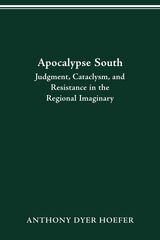3 books about Apocalypse in literature

Apocalypse South
Judgment, Cataclysm, and Resistance in the Regional Imaginary
Anthony Dyer Hoefer
The Ohio State University Press
While John Winthrop might have famously uttered the phrase “city upon a hill” on the way to Massachusetts, the strands of millennialism and exceptionalism that remain so central to U.S. political discourse are now dominated by eschatological visions that have emerged from the particular historical experiences of the U.S. South. Despite the strategic exploitation of this reality by political communicators, scholars in the humanities have paid little attention to the eschatological visions offered by southern religious culture.
Fortunately, writers and artists have not ignored such matters; compared to their academic counterparts, southern novelists have been far better attuned to a southern apocalyptic imaginary—a field of reference, drawn from the cosmology of southern evangelical Protestantism, that maps the apocalyptic possibilities of cataclysm, judgment, deliverance, and even revolution onto the landscape of the region. Apocalypse South rectifies the omissions in existing scholarship by interrogating the role of apocalyptic discourse in selected works of fiction by four southern writers—William Faulkner, Richard Wright, Randall Kenan, and Dorothy Allison. In doing so, it reinvigorates discussions of religion in southern literary scholarship and introduces a new element in the ongoing investigation into how regional identities function in notions of national mission and American exceptionalism. Engaging concerns of religion, race, sexuality, and community in fiction from the 1930s to the present, Apocalypse South offers a new conceptual framework for considering what has long been considered “southern Gothic literature”—a framework less concerned with the conventions of a particular literary genre than with the ways in which literature exposes and even tries to make sense of the contradictions within cultures.
[more]

Cormac McCarthy
An American Apocalypse
Markus Wierschem
Michigan State University Press, 2024
This definitive assessment of Cormac McCarthy’s novels captures the interactions among the literary and mythic elements, the social dynamics of violence, and the natural world in The Orchard Keeper, Child of God, Outer Dark, Blood Meridian, and The Road. Elegantly written and deeply engaged with previous scholarship as well as interviews with the novelist, this study provides a comprehensive introduction to McCarthy’s work while offering an insightful new analysis. Drawing on René Girard’s mimetic theory, mythography, thermodynamics, and information science, Markus Wierschem identifies a literary apocalypse at the center of McCarthy’s work, one that unveils another buried deep within the history, religion, and myths of American and Western culture.
[more]

From Utopia to Apocalypse
Science Fiction and the Politics of Catastrophe
Peter Y. Paik
University of Minnesota Press, 2010
"I read Peter Y. Paik’s lucid, graceful, ruthless book in one single astonished sitting. I scarred it all over with arrows and exclamation points, so I can read it again as soon as possible." —Bruce Sterling
Revolutionary narratives in recent science fiction graphic novels and films compel audiences to reflect on the politics and societal ills of the day. Through character and story, science fiction brings theory to life, giving shape to the motivations behind the action as well as to the consequences they produce.
In From Utopia to Apocalypse, Peter Y. Paik shows how science fiction generates intriguing and profound insights into politics. He reveals that the fantasy of putting annihilating omnipotence to beneficial effect underlies the revolutionary projects that have defined the collective upheavals of the modern age. Paik traces how this political theology is expressed, and indeed literalized, in popular superhero fiction, examining works including Alan Moore and Dave Gibbons’s graphic novel Watchmen, the science fiction cinema of Jang Joon-Hwan, the manga of Hayao Miyazaki, Alan Moore’s V for Vendetta, and the Matrix trilogy. Superhero fantasies are usually seen as compensations for individual feelings of weakness, victimization, and vulnerability. But Paik presents these fantasies as social constructions concerned with questions of political will and the disintegration of democracy rather than with the psychology of the personal.
What is urgently at stake, Paik argues, is a critique of the limitations and deadlocks of the political imagination. The utopias dreamed of by totalitarianism, which must be imposed through torture, oppression, and mass imprisonment, nevertheless persist in liberal political systems. With this reality looming throughout, Paik demonstrates the uneasy juxtaposition of saintliness and cynically manipulative realpolitik, of torture and the assertion of human dignity, of cruelty and benevolence.
[more]
READERS
Browse our collection.
PUBLISHERS
See BiblioVault's publisher services.
STUDENT SERVICES
Files for college accessibility offices.
UChicago Accessibility Resources
home | accessibility | search | about | contact us
BiblioVault ® 2001 - 2024
The University of Chicago Press









